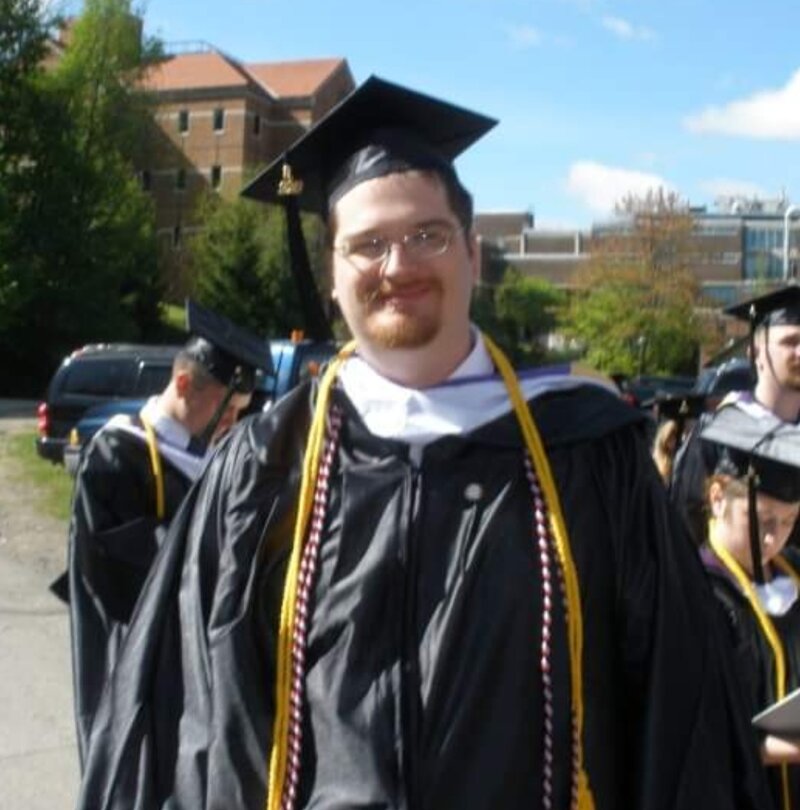Fitness Tips from a Formerly Obese Nerd
In Which I Explain the Misconceptions I had About Fitness
I used to be 300 lbs. Well, maybe - I was too afraid to weigh myself at my heaviest, and the first time after I began losing weight I was 292 lbs. Here I am at my college graduation.

Fortunately, I was able to drop 100 lbs in my 30s, and this led me down the path of fitness. I’m now a certified gym rat. Here’s an obligatory gym locker room selfie.

These pics are for my fitness cred - as for my nerd cred, well I guess you can check out my Github or something, it’s linked on the navigation bar.
These thoughts are mostly for people who are new to fitness, or considering losing weight or lifting. Don’t let anything I say stop you from starting - just do it!
Don’t take pride in your lack of athleticism / shunning of sunlight / dislike of nature
I’m putting this tip first, because I have “nerd” in the title of this post, so I wanted to start with nerd-specific advice.
I remember for many years having a perverse pleasure in shunning the outdoors. This was in the 1990s when I was a teenager, and the internet was new, and PC gaming was getting popular, and there was nothing lamer than wanting to hike in the woods.
I didn’t need the sun. I didn’t need their sportsball games. I didn’t want to talk walks in the woods. I was above that, I wasn’t superficial, my mind was what really mattered. Oof.
I don’t know how prevalent this attitude is among young people now. My impression is that, even though youth obesity is very high, people recognize the benefits of fitness and nature, even if they don’t actually partake themselves.
Anyway, this one is probably obvious, but if you’re a pasty, nonathletic basement dweller, don’t take pride in that. You can become more athletic, you can get more sunshine, you can shift your identity away from whatever it is now into a more healthy person.
“But it’s all genetics! I got bad genes, I’ll never be athletic.”
You won’t become a world-class athlete, sorry you had to hear it from me. If that was a possibility, you’d almost certainly have already been on that path.
So what? Nearly everyone in the world isn’t. I’m not naturally coordinated. I was never a good athlete. But this year I benched 225 lbs, last year I ran ten miles non-stop, the year before I biked 100 miles in a day. I went from being one of the worst players in my table tennis league to being… barely above the average.
Are those accomplishments all that impressive? That depends entirely on who you’re comparing against. Against the best people in those fields? Laughable. Against the average? Meh, it’s decent, but achievable for most people if they invest a few years. Against myself a decade ago? That guy would be blown away.
You can become a better version of yourself.
Developing a consistent routine is paramount, but make experimentation a part of the routine.
In all the advice I read when I was getting into fitness, people emphasized how important it was to develop the habits first. They’re not wrong - most people fail because they don’t make it a habit.
But what I didn’t understand was what consistency really meant. It just means that you keep showing up, week after week, month after month, year after year. It’s perseverance. It isn’t repetition!
For the first two years of lifting I took “routine” far too literally, and committed to a set of exercises with very little variation. This isn’t necessarily a bad strategy to start with, especially if you’ve picked good exercises (compound movements ideally). I got good gains, and it gave me the underlying strength I needed to even complete the more difficult lifts.
And this progress is the reason why the beginner advice doesn’t emphasize variety! When you’re new to lifting, as long as you commit and eat properly, sleep, etc, you will improve. That’s just how our bodies work.
But our bodies also adapt to whatever we’re asking them to do, and much more quickly than you might realize if you only stick to the same exercises. When I finally began introducing variety - both new exercises entirely and just variations on the same ones - I couldn’t believe how effective they were. It was like I was using muscles I’d never used before - because I was!
If your goal is strength or hypertrophy, then completely neglecting entire muscle groups for years is just a waste of your time. For example, I never did any delt training the first two years. I didn’t think about it, I was focused on improving squats, bench, pullups, and pushups.
Those were excellent choices, but it wouldn’t have cost me much extra time or effort to toss in a few sets of lateral raises once or twice a week. When I did begin training delts, wow! Why didn’t I start earlier?
Another example. I hate leg day like most people, and I mostly just did squats and lunges. I got quads that were completely filling out my jeans, honestly even bigger than I wanted, so I scaled back on squats and somewhat neglected my lower body.
Then recently I realized that was stupid, so I started squats again and added in leg extensions, which I never bothered with before. The burn is insane. After only a couple months of this, I can feel a remarkable difference, particularly in my stability. When I’m walking down stairs I feel much more in control of my weight. I could have gotten here years ago if I experimented.
It’s so easy too. Just try it, use light weights and high reps to feel the burn. It’s worth it.
View cardio as necessary for lifting
If you’re one of those folks that loves cardio, skip this section, you’re already golden you lucky bastards.
There’s a misconception that cardio kills muscle gains. I’ve looked into this, and there’s a kernel of truth here, but people exaggerate it. Don’t lift then do a long cardio session immediately afterwards, if you’re primarily going for hypertrophy. If you’re going for fat loss, keep it up. Otherwise, cardio any other time is usually beneficial, at least in moderation (if you’re an endurance athlete you can figure your own stuff out).
I used this fact as as excuse to not properly do cardio when bulking, and only focus on it when cutting. This is stupid, for several reasons.
First, it makes it easier to bulk too much. If you’re giving yourself the green flag to up your calories, while at the same time reducing activity, you’re likely to go overboard.
Second, it reduces your conditioning and makes lifting harder. After having neglected cardio for a couple of months while bulking, guess how I feel during a hard session? Like the idiot I am, gasping between sets. It feels awful to barely make it through a set because you’re winded.
Lastly, it makes it so much harder to cut. Sure, cutting is mostly about food, but if you hop back into cardio as most people do, then you feel like you’re starting back where you were when you first got into shape. That’s hard!
If you maintain your cardio constantly, everything becomes a little bit easier. View it as necessary to be a better lifter, if that’s what you need to believe.
Also, quick aside - if you’re really out of shape, “cardio” just means walking for you. Walk more. Seriously, you’d heard other people tell you this. I’m adding to the chorus. It worked wonders for me. WALK!
Accept the life-long nature of your commitment - and the life-long unseen rewards
I can’t know your reasons for improving your fitness, but I know what mine were initially. I had goals in mind. Goals that, if I achieved them, I know would improve my life.
I was right! And whatever your goals are, you’re probably right about them too.
But I came to realize that the goal-oriented approach to fitness isn’t the right way to view it. If your goal is weight loss, then you lose weight: goal achieved. Great! Now what? For far too many people, that’s as far as they’ve considered, and it often results in poor long-term outcomes.
You might think that you want to look good for your wedding, or that you want to be able to be more active with your children, or that you want to avoid the heart attack that took your father. And yeah, those are all valid.
But these are viewing fitness through a lens of particular outcomes which you can foresee. What I didn’t realize going into this was all the ways that this changed my life, and my perspective on what fitness really is. It’s not so much a means to an end, or a tool in the toolbox. It’s more like having a process in place to keep your tools clean, organized, and a plan for how to use them when you need them. It’s not about fixing something in your house, it’s about being able to fix something, and knowing that you’re able.
The word fitness is really the appropriate label. I used to think of that term and mentally think of someone who looked a certain way. I now think of someone who can do certain things.
This brings rewards that are hard to explain if you haven’t lived them. Or maybe I should say that you only see them if you lived a life without them, then obtained them.
But there’s a cost, of course - the life-long commitment that it entails. I’ve seen what happens to myself when my devotion wavers (aka the holidays). It’s worth it though.
Enjoy yourself
Last tip: fitness becomes more enjoyable over time, at least it did for me. Yes, some days it’s very difficult to hit the gym, or run, or avoid dessert. But I genuinely believe there are few better feelings than blasting that spotify soundtrack in your car on the ride home after an exhausting gym session, knowing that your body is happy about your choices.
I get restless without fitness now. My body wants it. Maybe this sounds bad if you’ve never experienced it. It’s not. It’s wonderful. Use your body.